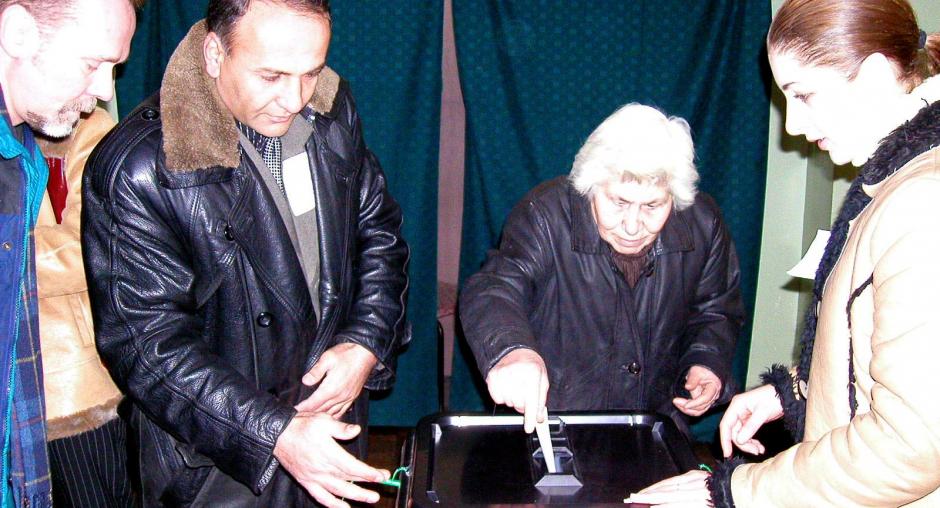Newsroom
Observers disappointed that Armenian election falls short of international standards
YEREVAN 6 March 2003

ODIHR observers monitoring the voting procedure in a ballot station during the first round of presidential election in Armenia, 19 February 2003. (OSCE) Photo details
YEREVAN, 6 March 2003 - Voting and counting in yesterday's second round presidential election in Armenia were marked by serious irregularities. The overall election process fell short of international standards. This is the conclusion of the 200-strong International Election Observation Mission deployed by the OSCE's Office for Democratic Institutions and Human Rights (ODIHR) and the Parliamentary Assembly of the Council of Europe (PACE).
"I am disappointed; we had hoped for better", said Peter Eicher, the head of the ODIHR long-term observation mission. "Once again we witnessed significant problems on election day, and the period between the two rounds did not meet international standards for an open and fair political campaign."
"At the same time, we want to pay tribute to the vast majority of Armenia's voters for their active and honest participation and to the many poll workers around the country who performed their duties conscientiously", added Lord Russell-Johnston, head of the PACE delegation. "For Armenia to advance democratically and to meet its commitments to the Council of Europe, we need the same attitude from the senior political leadership."
Of particular concern for international observers were the numerous, confirmed cases of ballot box stuffing.
The international observers welcomed that between the rounds no serious incidents of violence occurred despite the charged political atmosphere. They were pleased to see broad public involvement in the election process, as well as the participation of a number of domestic observer groups. The technical preparations for the second round of voting were generally efficient.
The period between the two rounds was, however, marred by a number of shortcomings. These included the detention of opposition proxies and campaign staff, discrepancies and implausible figures in the official results for the first round, and a general failure by the authorities to hold accountable those responsible for irregularities in the first round. The transparency of the tabulation process was undercut by the failure to promptly publish full preliminary results by precinct, thus undermining confidence in the figures.
Public TV was again biased in favour of the incumbent and failed to meet its obligation to provide balanced reporting. In a positive development, however, the first ever television debate between presidential candidates took place.
"I am disappointed; we had hoped for better", said Peter Eicher, the head of the ODIHR long-term observation mission. "Once again we witnessed significant problems on election day, and the period between the two rounds did not meet international standards for an open and fair political campaign."
"At the same time, we want to pay tribute to the vast majority of Armenia's voters for their active and honest participation and to the many poll workers around the country who performed their duties conscientiously", added Lord Russell-Johnston, head of the PACE delegation. "For Armenia to advance democratically and to meet its commitments to the Council of Europe, we need the same attitude from the senior political leadership."
Of particular concern for international observers were the numerous, confirmed cases of ballot box stuffing.
The international observers welcomed that between the rounds no serious incidents of violence occurred despite the charged political atmosphere. They were pleased to see broad public involvement in the election process, as well as the participation of a number of domestic observer groups. The technical preparations for the second round of voting were generally efficient.
The period between the two rounds was, however, marred by a number of shortcomings. These included the detention of opposition proxies and campaign staff, discrepancies and implausible figures in the official results for the first round, and a general failure by the authorities to hold accountable those responsible for irregularities in the first round. The transparency of the tabulation process was undercut by the failure to promptly publish full preliminary results by precinct, thus undermining confidence in the figures.
Public TV was again biased in favour of the incumbent and failed to meet its obligation to provide balanced reporting. In a positive development, however, the first ever television debate between presidential candidates took place.
